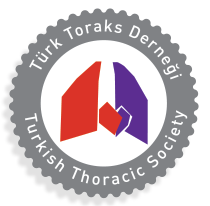Abstract
Abstract
Mediastinoscopy is a common procedure used for the diagnosis of thoracic disease and the staging of lung cancer. In order to determine the current role of mediastinoscopy in the evaluation of thoracic disease, we retrospectively reviewed all medistinoscopies performed in our section between 2001-2002. Of the 50 mediastinoscopies performed a total of 40 patients underwent mediastinoscopy for known or suspected lung cancer. In 10 of these patients, N2 or N3 disease was identified. The remaining 30 had no evidence of metastatic disease. Of these patients 21 had lung cancer. Only 2 of the patients with lung cancer were found N2 disease at exploration. Among the 30 patients with a negative mediastinoscopy, 2 patients underwent resection of a nonbronchogenic malignancy, and 4 had resections of benign lesion. 10 of these 50 patients underwent mediastinoscopy for the evaluation of mediastinal adenopathy in the absence of any identifiable pulmonary or endobronchial lesion. Of these, 4 had a nonbronchogenic malignancy, 5 had benign disease, and 1 had no established patological diagnosis; mediastinoscopy established a definitive diagnosis in 98% of the patients. In this group of 50 patients, there were no deaths, but 1 major and 4 minor complications. Mediastinoscopy is a highly effective and safe procedure. We believe that in the diagnosis and staging of thoracic diseases mediastinoscopy may be used in every patient when indicated.



